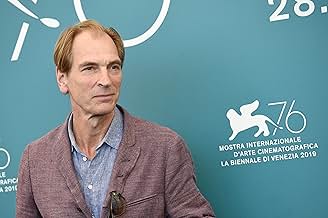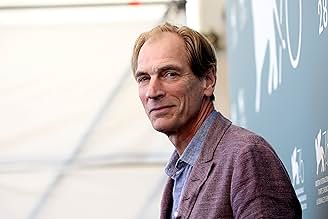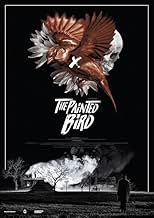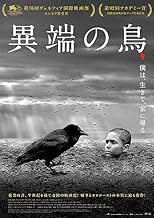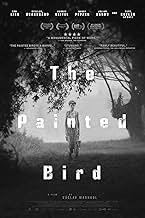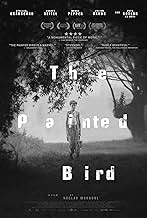NOTE IMDb
7,3/10
8,3 k
MA NOTE
En Europe de l'Est, un jeune garçon juif cherche refuge pendant la Seconde Guerre mondiale, où il rencontre de nombreux personnages différents.En Europe de l'Est, un jeune garçon juif cherche refuge pendant la Seconde Guerre mondiale, où il rencontre de nombreux personnages différents.En Europe de l'Est, un jeune garçon juif cherche refuge pendant la Seconde Guerre mondiale, où il rencontre de nombreux personnages différents.
- Réalisation
- Scénario
- Casting principal
- Récompenses
- 24 victoires et 24 nominations au total
Nina Sunevic
- Marta
- (as Nina Shunevych)
Marika Sarah Procházková
- Woman #1
- (as Marika Procházková)
Avis à la une
To be honest I had my doubts about this movie before watching it. A Czech black and white movie that is almost three hours long, it didn't look appealing to me, but after watching it I'm glad to admit I was wrong having those prejudices. The cinematography is stunning, certainly one of the best black and white movies I ever watched. Every shot is well thought of, beautiful work with the contrasts and shadows, dark images that fit perfectly with the very hard story. I get it that some viewers will hate it, it's not an easy movie to watch and not everybody is able to digest some of the brutal scenes. Personally I wasn't really bothered by it, it's just a movie, and those images contributed perfectly to the story. It's a story about constant abuse, the hard reality for some kids, whether you like it or not the war wasn't a nice period to live in, certainly not for a Jewish abandoned kid. Petr Kotlár did a stunning job playing his character, and even if there's not much talking in The Painted Bird you still get drawn into the story, mostly due to the excellent cinematography but also because of that very well chosen cast. Most of the actors are unknown to me, most of them look like they had a hard life (it changes from the usual goodlooking Hollywood actors we're normally bombarded with). Their faces showed the despair, the anger, the evil that was present in every character. If you watch this movie you will come to the conclusion there are no nice people in The Painted Bird. Beside the unknown cast I was surprised to see some very well known actors like Harvey Keitel, Stellan Skarsgård and others. They had smaller roles but were effective, and even if I doubt Harvey Keitel manages to speak Czech it looked all natural. The Painted Bird was a nice surprise to me, never expected that, but it's certainly not for everybody as the cruelty drips from every scene in this movie.
I had already read the 1965 novel THE PAINTED BIRD, and it most certainly stuck with me, so when I heard a film adaptation was coming out, I HAD to see it. I'm not sure if any of you have seen Asia Argento's film adaptation of JT Leroy's THE HEART IS DECEITFUL ABOVE ALL THINGS (starring the Sprouse twins) - this is basically the same movie, only it takes place with a Jewish boy during World War II rather than during contemporary times in America. It's like that movie at it's core but then mixed the aesthetics and vibes of, like, Schindler's List, and sometimes it even feels a bit like The Witch. In summary, it's about an orphaned boy wandering aimlessly trying to find a proper caretaker for himself but every single adult who takes him in is an evil person who abuses the child one way or another. Clearly, the relentlessness of the subject matter and the commitment to world-building entirely around it causes a lot of people (most people really) to despise both of these movies. However, it is clear to me that these were created as cathartic pieces of art - though it's doubtful that this ever happened this relentlessly to any child, by so many different people, it is POSSIBLE, but that's irrelevant because the film functions as a surrealist interpretation of the aloneness, the helplessness, and the inescapable claustrophobia that some children do feel as they struggle to find the footing in their developmental existence. The 3-hour runtime does cause the film to feel a bit redundant at points, but that's really the movie's only flaw, and in the end it's a rewarding viewing - all of the performances are dynamic, brave, and many of them are frightening or at the very least jarring. There are are small roles from Harvey Keitel, Barry Pepper, and a very important actor to me, Julian Sands - in probably his creepiest appearance ever. The environments and cinematography are both impressive - gorgeous but effectively bleak to match the tone. What it comes down to is that this is a beautiful film about the ugliest thing. It's not for everyone - just looks at the reviews, you could say "people hate it" - that's what the reviews show, but the truth is there is a lot to marvel at and praise here. People just can't handle certain levels of darkness in art. The most interesting part of all of this is that both books THE HEART IS DECEITFUL ABOVE ALL THINGS and THE PAINTED BIRD were originally marketed as autobiographical memoirs when they found success, then both were shunned when it was revealed that they were actually entirely fictional. THE PAINTED BIRD is the original HEART IS DECEITFUL - I just never realized it until now. Take from that what you will.
"The Painted Bird" (2019 release from the Czech Republic; 169 min.) brings the story of a young (Jewish, we later learn) boy, never mentioned by name and simply known as "the Boy". As the movie opens, the Boy is running in the woods holding a pet, only to be brutally attacked by other boys, who also burn his pet alive. The Boy returns to home, home being a remote place with his aunt somewhere in Eastern Europe in the late stages of WWII. When his aunt dies (and he accidentally sets the place on fire), he is forced to find his way, but to where? This is the start of a long journey. At this point we are less than 15 min. into the movie but to tell you more of the plot would spoil your viewing experience, you'll just have to see for yourself how it all plays out.
Couple of comments: this is the big screen adaptation of the book of the same name. I haven't read the book, so I cannot comment how closely the film sticks to the book. To say that the book, and now the film, have been controversial would be the understatement of the year. The film is brought in chapters, each called for the person(s) in care of the young boy, maybe 9 or 10 years old: "Marta" (his aunt) start things off. The first hour of the movie is surreal and shocking on many levels, as the boy endures cruelty upon cruelty, Along the way we also watch animal cruelty, spousal abuse, and worse. Cheerier times are far away. Yet as we endure this, we also become strongly attached to the survival journey and fate of the boy: what will become of him? The movie is shot entirely in B&W, reflecting the gloomy atmosphere of remote Eastern Europe. There are some spectacular acting performances, none more so than the boy who plays the Boy, but also keep your eye out for Harvey Keitel, yes THE Harvey Keitel, playing a priest who takes the Boy under his wings for a while. BEWARE: there are a number of disturbing scenes in the film, and to say that this isn't for the faint of heart would be the understatement of the year. Yet if you can handle it, you are in for a WILD and moving but bleak tale of a young boy's WWII survival drama, the likes of which you surely haven't seen before.
"The Painted Bird" premiered to controversy and critical acclaim at the same time at last Fall's Venice Film Festival. It opened this weekend at my local art-house theater here in Cincinnati, and I couldn't wait to see it. The theater is adhering strictly to CDC guidelines in this COVID-19 pandemic. Not that it mattered as the Friday early evening screening where I saw this at turned out to be a private screening, as in: I was literally the only person in the theater. If you are in the mood for a grim and bleak but extraordinary tale of what trying to survive WWII might've looked like for a young Jewish boy, I'd readily suggest you check this out, be it in the theater (if you can), on VOD, or on DVD/Blu-ray, and draw your own conclusion.
Couple of comments: this is the big screen adaptation of the book of the same name. I haven't read the book, so I cannot comment how closely the film sticks to the book. To say that the book, and now the film, have been controversial would be the understatement of the year. The film is brought in chapters, each called for the person(s) in care of the young boy, maybe 9 or 10 years old: "Marta" (his aunt) start things off. The first hour of the movie is surreal and shocking on many levels, as the boy endures cruelty upon cruelty, Along the way we also watch animal cruelty, spousal abuse, and worse. Cheerier times are far away. Yet as we endure this, we also become strongly attached to the survival journey and fate of the boy: what will become of him? The movie is shot entirely in B&W, reflecting the gloomy atmosphere of remote Eastern Europe. There are some spectacular acting performances, none more so than the boy who plays the Boy, but also keep your eye out for Harvey Keitel, yes THE Harvey Keitel, playing a priest who takes the Boy under his wings for a while. BEWARE: there are a number of disturbing scenes in the film, and to say that this isn't for the faint of heart would be the understatement of the year. Yet if you can handle it, you are in for a WILD and moving but bleak tale of a young boy's WWII survival drama, the likes of which you surely haven't seen before.
"The Painted Bird" premiered to controversy and critical acclaim at the same time at last Fall's Venice Film Festival. It opened this weekend at my local art-house theater here in Cincinnati, and I couldn't wait to see it. The theater is adhering strictly to CDC guidelines in this COVID-19 pandemic. Not that it mattered as the Friday early evening screening where I saw this at turned out to be a private screening, as in: I was literally the only person in the theater. If you are in the mood for a grim and bleak but extraordinary tale of what trying to survive WWII might've looked like for a young Jewish boy, I'd readily suggest you check this out, be it in the theater (if you can), on VOD, or on DVD/Blu-ray, and draw your own conclusion.
Greetings again from the darkness. Polish-American writer Jerzy Kosinski's 1965 novel "The Painted Bird" has one of the strangest and most controversial histories of any book. Initially celebrated as an extraordinary piece on the Holocaust era, the novel was banned in Poland, and author Kosinski was accused of falsifying claims of it being an autobiographical work. Later he was accused of plagiarism for this book and his 1970 book "Being There" (adapted into a 1979 movie starring Peter Sellers). This story of a young Jewish boy, abandoned by his parents and traveling the Eastern Europe countryside during WWII, is now accepted as a blend of fiction and his friend (director) Roman Polanski's experiences. Czech filmmaker Vaclav Marhoul has turned the book into a stunning viewing experience.
First time actor Petr Kotlar is extraordinary as the unnamed (until the end) Jewish boy on a journey that might be entitled Dante's Circle of Abuse or Homer's Odyssey of Misery. This is a young boy in need of kindness from strangers, but unable to find much. The film opens with the boy running through the woods carrying what appears to be his pet ferret. He's being chased by a group of sadistic Anti-Semite bullies. It's a chase that doesn't end well. We learn the boy is living with his "Auntie" Marta (Nina Sunevic) on her rundown farm, and we intuit that his parents thought he would be safer here than with them. When the woman dies suddenly and unexpectedly, the boy accidentally burns the house down, kicking off his walk across the countryside. Almost inexplicably, this is the most upbeat segment of the film.
Director Marhoul divides the film into 9 chapters, each named after the person the boy meets and lives with temporarily. I'll recap the following eight chapters with a focus on not giving away too much ... just know that this film is unrelenting in its brutality and bleakness. After Marta's death, the boy stumbles into a village where he is considered cursed and labeled a vampire. The witch doctor Olga (Ala Sakalova) enslaves him until he escapes down river, where he is rescued by a mill worker. The head miller (Udo Kier) is a frightening man who takes exception with his worker (not the boy) gazing lustfully at his wife. Kier's eyes manage to burn right through the black and white film, and soon he turns exceedingly violent towards his wife and the worker, leaving us with an unforgettable visual.
The boy then finds himself at the home of Lekhi (Lech Dyblik) who captures wild birds and regularly hooks up with Ludmila (Jitka Cvancorova), a wild woman who lives in the forest. The boy witnesses two horrific deaths, but not before the sequence which gives the film its title and ensures we understand what happens to outcasts - those who are different. At about the one hour mark, the boy finds an injured horse and walks it into the local village. It's at this point where we hear him speak (kind of) for the first time. A violent Russian invasion of the village results in the Cossacks offering the bound and gagged Jewish boy to the German soldiers as a "gift". Stellan Skarsgard is the veteran soldier who draws the assignment of taking the boy into the woods to shoot him.
When the soldier sends him on his way, a sickly Catholic Priest (Harvey Keitel) takes the boy under his wing and trains him to be an altar boy. All is fine until a parishioner (Julian Sands) with despicable intentions agrees to take the boy in and provide for him. This segment has what may be the most cringe-inducing death scene in the film, after which we find the boy trudging through snow and falling through ice, and crawling towards a cabin where Labrina (Julia Valentova) and a sickly old man live. The boy faces more abuse as he's incapable of pleasing Labrina, which leads to situations he's much too young to understand. Traumatized, the boy's personality takes a turn.
In his next village, an attack by Germans puts the boy in contact with Russian sniper Mitka (Barry Pepper), who leaves him with the real life advice of, "an eye for an eye, and a tooth for a tooth." Having only recently lost his innocence, the advice hits home for the boy. He ends up in an orphanage where a surprise occurs that causes the boy to lash out in anger ... at least until he observes something that makes him understand the world has been cruel to others, not just him.
Normally, I wouldn't recap or outline the segments of a movie in this manner, but it's crucial to understand what you are about to watch. It's a nearly 3 hour epic of human cruelty and survival instinct. Young Petr Kotlar spends much of the movie taking and witnessing abuse while his face is near emotionless (save for a couple of extremes). Joy is elusive, if not non-existent. The film shows us not all Holocaust horrors occurred in death camps. The atrocities of war and the cruelty of humans result in a film that is beyond bleak at times, but also makes a clear point about how differently people treat those not "like" us, regardless who the "us" is. This point is as evident today as it was during WWII.
Director Marhoul excels in showing, rather than telling ... there is almost no 'telling' throughout the film. Cinematographer Vladimir Smutney makes expert use of the 35mm black & white film to provide images that are stark and brutal like the world the boy sees. The Production Design from Jan Vlasak puts us right in the muck, while the Sound from Jakub Cech is crucial to every scene.
The film is a joint project of Czech Republic, Slovakia, and Ukraine, as Poland refused to participate. It had quite the festival run last year, including some high profile walk-outs during the Venice Film Festival. It's one of the rare movies that every cinephile is thankful to have seen, yet as human beings, we would likely never want to watch again. Murder, abuse, suicide, torture, bestiality, rape, violence, cruelty, slaughter, pedophilia, incest, war atrocities ... these aren't topics we typically seek out, and they thankfully aren't topics that all show up in a single movie very often! There are a few moments of compassion if you watch closely, but mostly it's a reminder of the cruelty of humans when the structure of society collapses, and hope is hard to come by. As Edwin Starr sang in his number one hit in 1970, "War, good God. What is it good for? Absolutely nothing."
First time actor Petr Kotlar is extraordinary as the unnamed (until the end) Jewish boy on a journey that might be entitled Dante's Circle of Abuse or Homer's Odyssey of Misery. This is a young boy in need of kindness from strangers, but unable to find much. The film opens with the boy running through the woods carrying what appears to be his pet ferret. He's being chased by a group of sadistic Anti-Semite bullies. It's a chase that doesn't end well. We learn the boy is living with his "Auntie" Marta (Nina Sunevic) on her rundown farm, and we intuit that his parents thought he would be safer here than with them. When the woman dies suddenly and unexpectedly, the boy accidentally burns the house down, kicking off his walk across the countryside. Almost inexplicably, this is the most upbeat segment of the film.
Director Marhoul divides the film into 9 chapters, each named after the person the boy meets and lives with temporarily. I'll recap the following eight chapters with a focus on not giving away too much ... just know that this film is unrelenting in its brutality and bleakness. After Marta's death, the boy stumbles into a village where he is considered cursed and labeled a vampire. The witch doctor Olga (Ala Sakalova) enslaves him until he escapes down river, where he is rescued by a mill worker. The head miller (Udo Kier) is a frightening man who takes exception with his worker (not the boy) gazing lustfully at his wife. Kier's eyes manage to burn right through the black and white film, and soon he turns exceedingly violent towards his wife and the worker, leaving us with an unforgettable visual.
The boy then finds himself at the home of Lekhi (Lech Dyblik) who captures wild birds and regularly hooks up with Ludmila (Jitka Cvancorova), a wild woman who lives in the forest. The boy witnesses two horrific deaths, but not before the sequence which gives the film its title and ensures we understand what happens to outcasts - those who are different. At about the one hour mark, the boy finds an injured horse and walks it into the local village. It's at this point where we hear him speak (kind of) for the first time. A violent Russian invasion of the village results in the Cossacks offering the bound and gagged Jewish boy to the German soldiers as a "gift". Stellan Skarsgard is the veteran soldier who draws the assignment of taking the boy into the woods to shoot him.
When the soldier sends him on his way, a sickly Catholic Priest (Harvey Keitel) takes the boy under his wing and trains him to be an altar boy. All is fine until a parishioner (Julian Sands) with despicable intentions agrees to take the boy in and provide for him. This segment has what may be the most cringe-inducing death scene in the film, after which we find the boy trudging through snow and falling through ice, and crawling towards a cabin where Labrina (Julia Valentova) and a sickly old man live. The boy faces more abuse as he's incapable of pleasing Labrina, which leads to situations he's much too young to understand. Traumatized, the boy's personality takes a turn.
In his next village, an attack by Germans puts the boy in contact with Russian sniper Mitka (Barry Pepper), who leaves him with the real life advice of, "an eye for an eye, and a tooth for a tooth." Having only recently lost his innocence, the advice hits home for the boy. He ends up in an orphanage where a surprise occurs that causes the boy to lash out in anger ... at least until he observes something that makes him understand the world has been cruel to others, not just him.
Normally, I wouldn't recap or outline the segments of a movie in this manner, but it's crucial to understand what you are about to watch. It's a nearly 3 hour epic of human cruelty and survival instinct. Young Petr Kotlar spends much of the movie taking and witnessing abuse while his face is near emotionless (save for a couple of extremes). Joy is elusive, if not non-existent. The film shows us not all Holocaust horrors occurred in death camps. The atrocities of war and the cruelty of humans result in a film that is beyond bleak at times, but also makes a clear point about how differently people treat those not "like" us, regardless who the "us" is. This point is as evident today as it was during WWII.
Director Marhoul excels in showing, rather than telling ... there is almost no 'telling' throughout the film. Cinematographer Vladimir Smutney makes expert use of the 35mm black & white film to provide images that are stark and brutal like the world the boy sees. The Production Design from Jan Vlasak puts us right in the muck, while the Sound from Jakub Cech is crucial to every scene.
The film is a joint project of Czech Republic, Slovakia, and Ukraine, as Poland refused to participate. It had quite the festival run last year, including some high profile walk-outs during the Venice Film Festival. It's one of the rare movies that every cinephile is thankful to have seen, yet as human beings, we would likely never want to watch again. Murder, abuse, suicide, torture, bestiality, rape, violence, cruelty, slaughter, pedophilia, incest, war atrocities ... these aren't topics we typically seek out, and they thankfully aren't topics that all show up in a single movie very often! There are a few moments of compassion if you watch closely, but mostly it's a reminder of the cruelty of humans when the structure of society collapses, and hope is hard to come by. As Edwin Starr sang in his number one hit in 1970, "War, good God. What is it good for? Absolutely nothing."
It's an eastern european movie at its core: raw, uncompromising, brutal, dim, hopeless and honest.
Brutality actually lead to several people leaving the screening I attended to at Venice 76. Here, this movie was labeled as '14+' but I believe it can be easily rated NC-17. The brutality of this movie includes some very graphic gore (although it's mostly present in the first half of the movie) and sexual-related violence (mostly implied but persistent throughout the film). I believe that, as of on-screen depiction of violence, this film probably outranks Schindler's List (although It isn't as vast scaled as Spielberg's film).
Stylistically, this film uses mostly the visual medium rather than conversations to provide information to the viewer. Dialogue becomes secondary at a point where the main character maybe utters a couple of lines throughout the movie, and some of the characters he meets with are entirely silent (Skasgard's character, for example).
The film has a very precise structure: it is made up of 8 chapters, each entitled after a character that the kid meets with, and each chapter reaches a moment when the screen fades to black. After that, a sort-of connective sequence displays the events that lead the kid to change his whereabouts. Among the characters he meets, the audience might recognize Alexander Skasgard, but also Harvey Keitel (in an entirely czech-speaking role) as well as Barry Pepper and german actor Udo Kier.
I wouldn't say that The Painted Bird is a holocaust or ww2 movie, or better, it isn't only that. Thematic elements that relate to either the Holocaust or the War, with the exception of a german plane seen early on, come up only after around one hour in-movie. Before that, whatever happens is mostly related to a strongly rural and superstitious society.
The Painted Bird pays implicit homage to several Eastern European films. The opening sequence mimics the one seen in Jan Nemec's "Diamonds of the Night", a lot of settings remind Elem Klimov's "Come and See" and Tarkovsky's "Ivan's Childhood", the overall fatalist tone reminds strongly of Bela Tarr's films.
It is an outstanding accomplishment, and I sincerely hope that this movie, despite its graphic content, receives enough recognition.
Brutality actually lead to several people leaving the screening I attended to at Venice 76. Here, this movie was labeled as '14+' but I believe it can be easily rated NC-17. The brutality of this movie includes some very graphic gore (although it's mostly present in the first half of the movie) and sexual-related violence (mostly implied but persistent throughout the film). I believe that, as of on-screen depiction of violence, this film probably outranks Schindler's List (although It isn't as vast scaled as Spielberg's film).
Stylistically, this film uses mostly the visual medium rather than conversations to provide information to the viewer. Dialogue becomes secondary at a point where the main character maybe utters a couple of lines throughout the movie, and some of the characters he meets with are entirely silent (Skasgard's character, for example).
The film has a very precise structure: it is made up of 8 chapters, each entitled after a character that the kid meets with, and each chapter reaches a moment when the screen fades to black. After that, a sort-of connective sequence displays the events that lead the kid to change his whereabouts. Among the characters he meets, the audience might recognize Alexander Skasgard, but also Harvey Keitel (in an entirely czech-speaking role) as well as Barry Pepper and german actor Udo Kier.
I wouldn't say that The Painted Bird is a holocaust or ww2 movie, or better, it isn't only that. Thematic elements that relate to either the Holocaust or the War, with the exception of a german plane seen early on, come up only after around one hour in-movie. Before that, whatever happens is mostly related to a strongly rural and superstitious society.
The Painted Bird pays implicit homage to several Eastern European films. The opening sequence mimics the one seen in Jan Nemec's "Diamonds of the Night", a lot of settings remind Elem Klimov's "Come and See" and Tarkovsky's "Ivan's Childhood", the overall fatalist tone reminds strongly of Bela Tarr's films.
It is an outstanding accomplishment, and I sincerely hope that this movie, despite its graphic content, receives enough recognition.
Le saviez-vous
- AnecdotesIn the 1960s, writer Jerzy Kosinski had become famous in Manhattan literary circles for his astonishing tales about the brutalities he had allegedly suffered during the Second World War. Abandoned by his parents at the age of six, he claimed he had roamed the countryside alone, witnessing rape, murder, and incest, constantly fearing for his life. Kosinski turned those stories into his first novel, "The Painted Bird", which, for a time, was considered a major work of Holocaust literature. Kosinski's claims were later debunked when it was revealed that he and his parents had all been sheltered by religious Poles who had never handed him over to the Nazis.
- GaffesAfter the old man died, Lubina rolled him face down in his grave. The next shot he lies face up.
- ConnexionsFeatured in CT na MFF Karlovy Vary 2019: Nabarvené ptáce (2019)
- Bandes originalesFür Elise
Music by Ludwig van Beethoven
Meilleurs choix
Connectez-vous pour évaluer et suivre la liste de favoris afin de recevoir des recommandations personnalisées
- How long is The Painted Bird?Alimenté par Alexa
Détails
- Date de sortie
- Pays d’origine
- Sites officiels
- Langues
- Aussi connu sous le nom de
- The Painted Bird
- Lieux de tournage
- Sociétés de production
- Voir plus de crédits d'entreprise sur IMDbPro
Box-office
- Budget
- 175 000 000 CZK (estimé)
- Montant brut aux États-Unis et au Canada
- 1 460 $US
- Week-end de sortie aux États-Unis et au Canada
- 452 $US
- 19 juil. 2020
- Montant brut mondial
- 659 535 $US
- Durée2 heures 49 minutes
- Couleur
- Mixage
- Rapport de forme
- 2.39 : 1
Contribuer à cette page
Suggérer une modification ou ajouter du contenu manquant

Lacune principale
What is the streaming release date of L'oiseau bariolé (2019) in Australia?
Répondre



